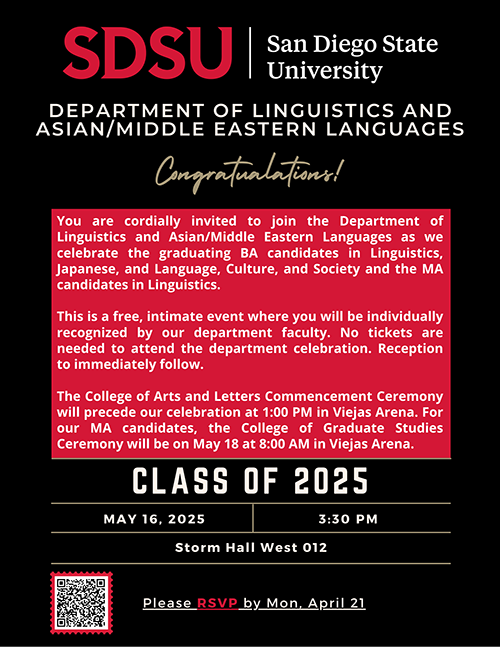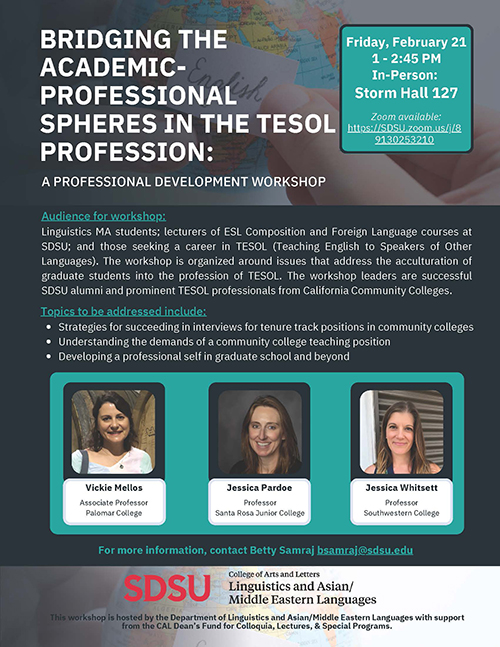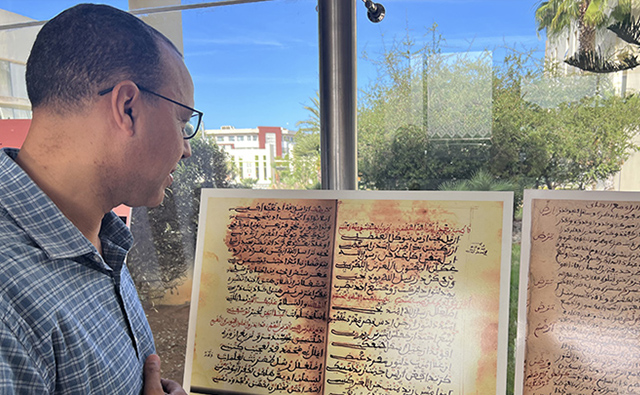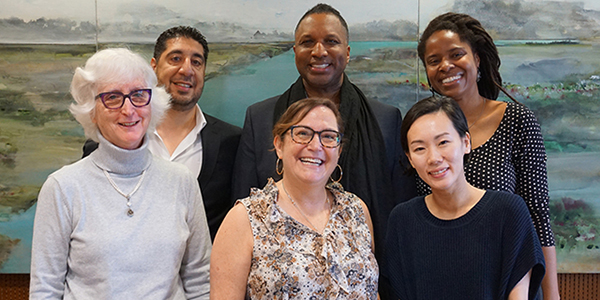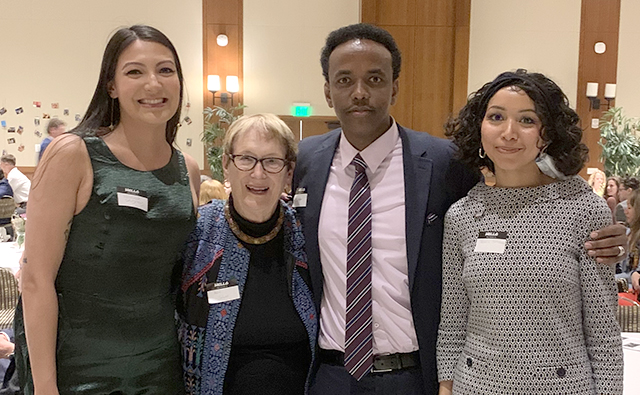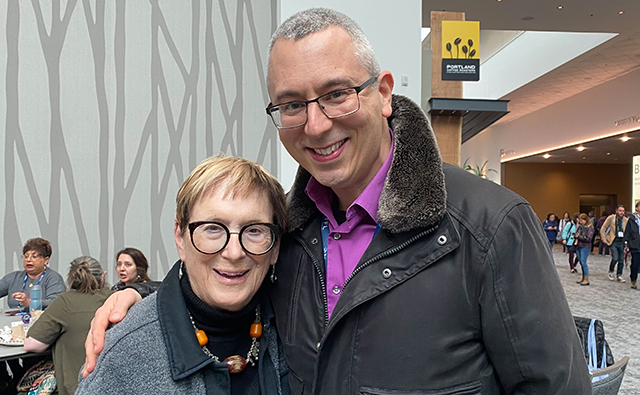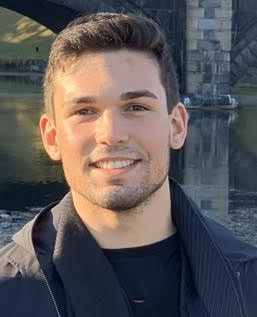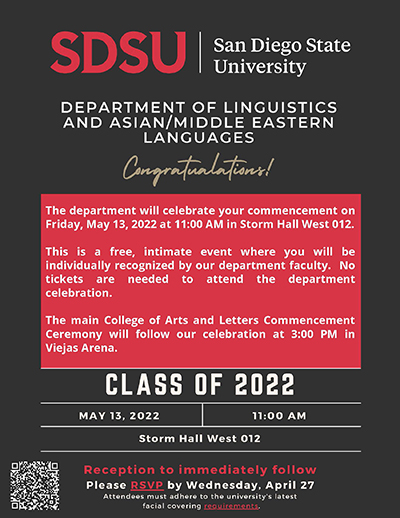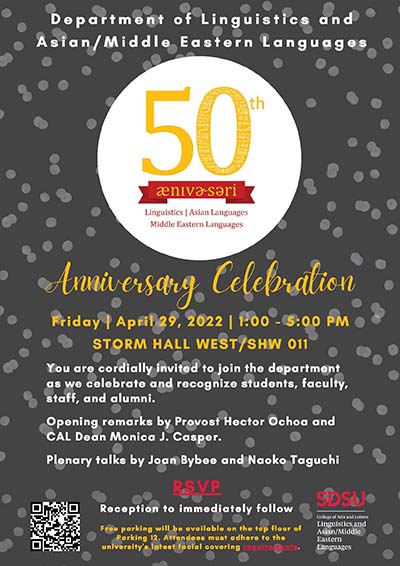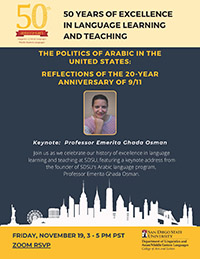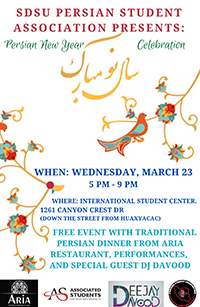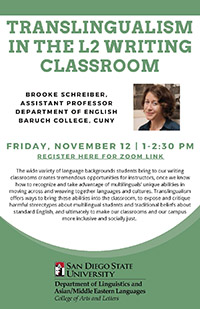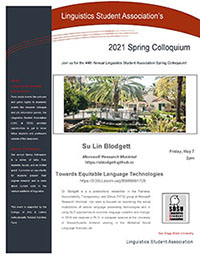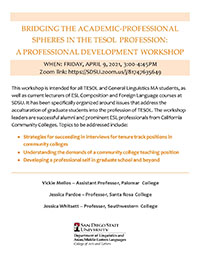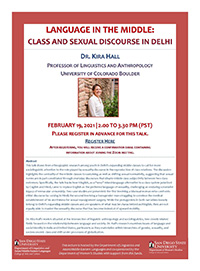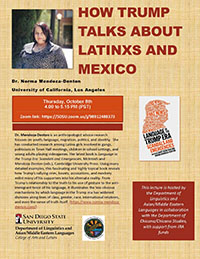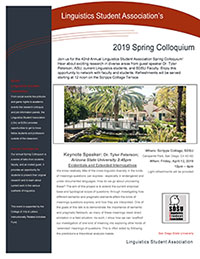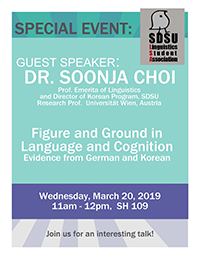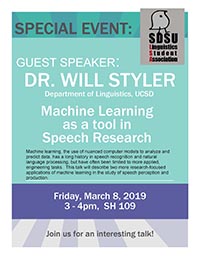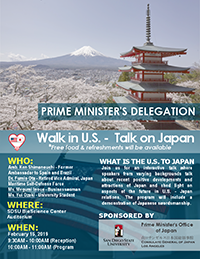
News and Events
Outstanding Graduating Seniors
Congratulations to our Outstanding Graduating Seniors and their Most Influential Faculty.
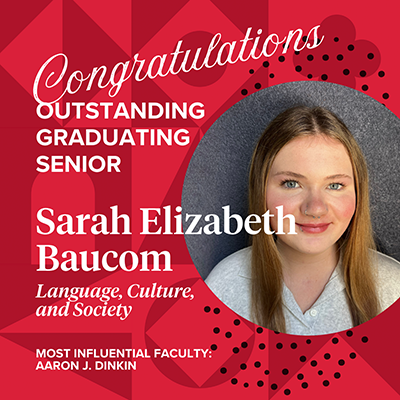 Language, Culture, and Society
Language, Culture, and Society
Sarah Elizabeth Baucom
Most Influential Faculty: Aaron J. Dinkin
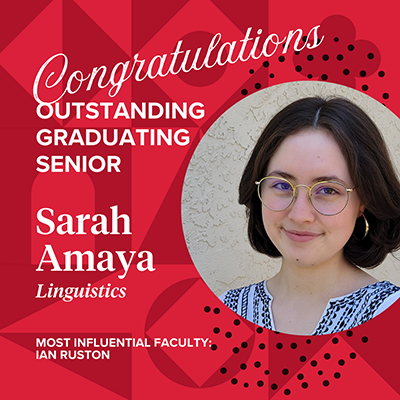 Linguistics
Linguistics
Sarah Amaya
Most Influential Faculty: Ian Ruston
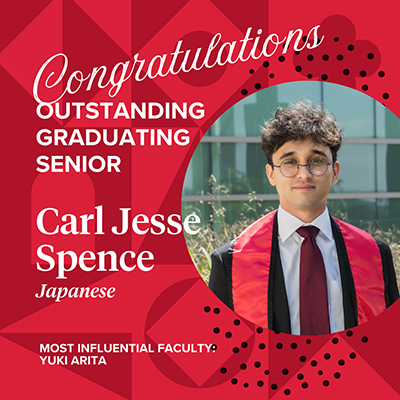 Japanese
Japanese
Carl Jesse Spence
Most Influential Faculty: Yuki Arita
Commencement 2025
Please join the Department of Linguistics and Asian/Middle Eastern Languages for a Graduation Celebration on Friday, May 16 at 3:30 PM in Storm Hall West 012 where each graduate will be individually recognized.
We hope that you, your family, and your friends will be able to join us. Your professors look forward to honoring you and wishing you the best. We look forward to seeing you.
The College of Arts and Letters Commencement Ceremony will precede our celebration at 1:00 PM in Viejas Arena. For our MA candidates, the College of Graduate Studies Ceremony will be on May 18 at 8:00 PM in Viejas Arena.
Darlene Bych, our other administrative coordinator, is collecting pictures that capture moments in your university life for a slide presentation. Please send any pictures you may have for selection for this short presentation to [email protected] by Monday, May 5.
SDSU Student Symposium 2025
Congratulations to our Linguistics students who participated in the 2025 SDSU Student Symposium (S³):
An Analysis of ChatGPT Written Feedback on Second Language Academic Writing
Natacha Garbe, Master's student
When words collide: An eye-tracking study examining the impact of top-down and bottom-up
input during bilingual picture-word matching
Jaime Antoshak, Undergraduate student
Move Analysis on Candidate Statements
Liliana Reyes, Master's student
ESL and Multilingual Students’ Perception and Strategies of Use With Generative AI
Madeline Kerins, Undergraduate student
Bridging Academic-Professional Spheres in the TESOL Profession: A Professional Development Workshop
Friday, February 21, 2025
1 - 2:45 p.m.
in Storm Hall 127
Audience for workshop:
Linguistics MA students; lecturers of ESL Composition and Foreign Language courses at SDSU; and those seeking a career in TESOL (Teaching English to Speakers of Other Languages). The workshop is organized around issues that address the acculturation of graduate students into the profession of TESOL. The workshop leaders are successful SDSU alumni and prominent TESOL professionals from California Community Colleges.
Topics to be addressed include:
- Strategies for succeeding in interviews for tenure track positions in community colleges
- Understanding the demands of a community college teaching position
- Developing a professional self in graduate school and beyond
This workshop was hosted by the Department of Linguistics and Asian/Middle Eastern Languages with support from the College of Arts and Letters Dean’s Fund for Colloquia, Lectures, & Special Programs.
Newsletter
Check out the latest edition of our newsletter, Distinctive Features. Inside, you will find a variety of news, including information on our exciting new hires, retirements of long-term faculty, changes and expansions in our curricula, and a variety of events we continue to host.
New Minor
Have you wondered how being bilingual affects how we think and behave? Our new minor
in Language Acquisition and Bilingualism (LAB) is for you!
Featured on 60 Minutes
Professor Zheng-sheng Zhang was featured on 60 minutes for the segment, "Chinese migrants are the fastest growing group crossing into US from Mexico." He also wrote an opinion piece about the experience for the San Diego Union Tribune.
Outstanding Graduating Seniors
Congratulations to our Outstanding Graduating Seniors and their Most Influential Faculty.
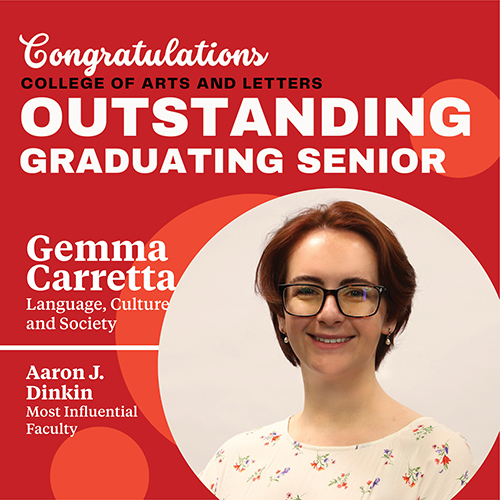 Language, Culture, and Society
Language, Culture, and Society
Gemma Carretta
Most Influential Faculty: Aaron J. Dinkin
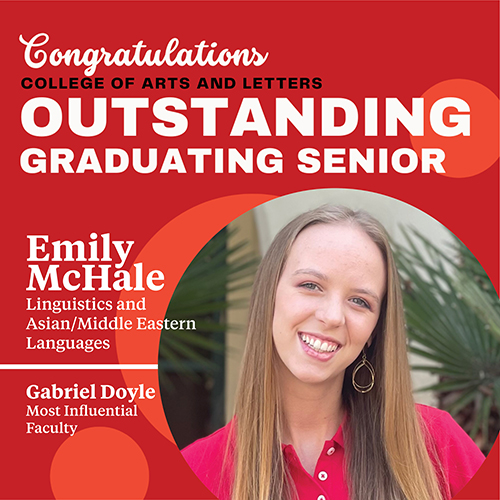 Linguistics
Linguistics
Emily McHale
Most Influential Faculty: Gabriel Doyle
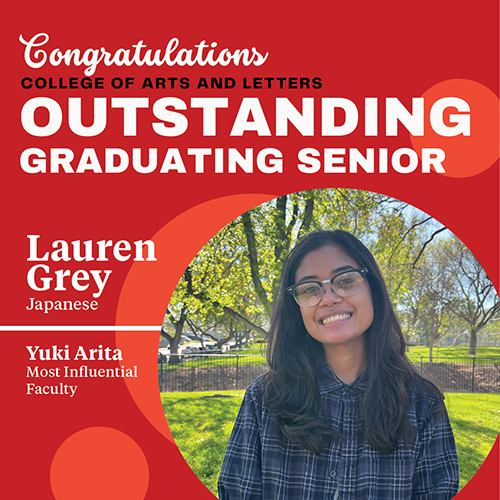 Japanese
Japanese
Lauren Grey
Most Influential Faculty: Yuki Arita
CAL Excellence Awards
Congratulations to the CAL Excellence Award winner:
Naseh Nasdrollahi Shahri for Excellence in Research, Scholarship, and Creative Activity, Tenured-Track Faculty.
Read more about the award on the CAL website.
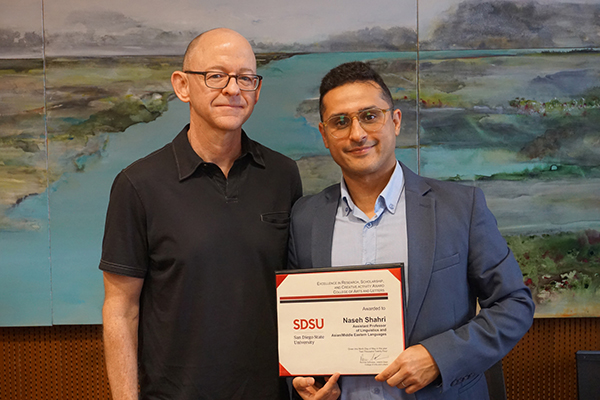 Department chair, Greg Keating and Naseh Nasdrollahi Shahri
Department chair, Greg Keating and Naseh Nasdrollahi Shahri
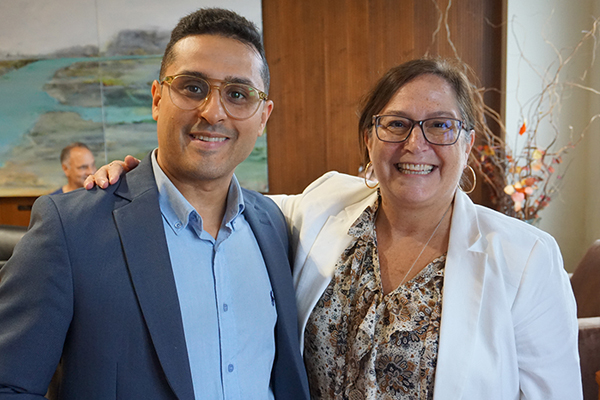 Naseh Nasdrollahi Shahri and Interim Dean, Ronnee Schreiber
Naseh Nasdrollahi Shahri and Interim Dean, Ronnee Schreiber
Commencement 2024
Please join the Department of Linguistics and Asian/Middle Eastern Languages for a Graduation Celebration on Friday, May 10 at 3:30 PM in Storm Hall West 012 where each graduate will be individually recognized.
We hope that you and your family and friends will be able to join us. Your professors look forward to honoring you and wishing you the best. We look forward to seeing you.
The College of Arts and Letters Commencement Ceremony will precede our celebration at 1:00 PM in Viejas Arena. For our MA candidates, the College of Graduate Studies Ceremony will be on May 12 at 5:00 PM in Viejas Arena.
Darlene Bych, our other administrative coordinator, is collecting pictures that capture moments in your university life for a slide presentation. Please send any pictures you may have for selection for this short presentation to [email protected] by Friday, April 26.
47th Annual Colloquium
Friday, April 26
12:30 - 4 p.m.
Storm Hall (SH) 119
Our annual colloquium is a series of talks from students, faculty, and invited guest speakers. It provides an opportunity for students to present their original research and to learn about current work in the various subfields of linguistics.
Schedule
- 12:30 p.m. - Student Presentations
- 1:45 p.m. - Keynote Speaker
- 3:00 p.m. - Reception on the Patio
Keynote Speaker: Gašper Beguš, UC Berkeley
Learning Language with FiwGAN
There are many ways to model language -- with rules, exemplars, finite state machines, or Bayesian approaches. In this talk, I propose a way to model language in a fully unsupervised way from raw speech: as a dependency between latent space and generated data in generative AI models called GANs. I argue that such modeling has implications both for the understanding of language acquisition and for the understanding of how deep neural networks learn internal representations. I propose an extension of the GAN architecture (fiwGAN) in which meaningful linguistic properties emerge from two networks learning to exchange information. FiwGAN captures the perception-production loop of human speech and, unlike most other deep learning architectures, has traces of communicative intent. I further propose a technique to identify latent variables in deep convolutional networks that represent linguistically meaningful units in a causal, disentangled, and interpretable way. We can thus uncover symbolic-like representations at the phonetic, phonological, syntactic and lexical semantic levels, analyze how learning biases in GANs match human learning biases in behavioral experiments, how speech processing in the brain compares to intermediate representations in deep neural networks, and what GANs’ innovative can teach us about productivity in human language.
Gašper Beguš is an Assistant Professor at the Department of Linguistics at UC Berkeley where he directs the Berkeley Speech and Computation Lab. He is also the Linguistics Lead at Project CETI and a Member of Berkeley's Institute of Cognitive and Brain Sciences. Previously, he was an Assistant Professor at the University of Washington. Before that, he graduated with a Ph.D. from Harvard. His research focuses on developing deep learning models for speech data. Gasper combines machine learning and statistical models with neuroimaging and behavioral experiments to better understand how deep neural networks learn internal representations and how humans learn to speak.
This event is sponsored by the Department of Linguistics and Asian/Middle Eastern Languages and is supported by the College of Arts & Letters Instructionally Related Activities Fund.
AI-Assisted Process Writing: A New Paradigm for Second Language Writing
Featuring: Amin Davoodi, Assistant Professor of Bilingual/ESL Education, University of Texas
Wednesday, March 27
1 p.m.
on Zoom
Since the emergence of Chat-GPT, an increasing number of researchers and educators in the field of second language acquisition have begun to explore the potential of integrating AI into language learning. One particular area that stands to benefit from the integration of generative AI is second language writing. In this presentation, I advocate for a pedagogical transformation, moving away from traditional product-focused methods in second language writing instruction towards an AI-assisted approach that emphasizes the writing process. To this end, I will explore how AI can provide personalized feedback, generate adaptive writing prompts, assist with grammar and style corrections, and facilitate review processes. These AI-assisted interventions are designed to support L2 learners on their writing journeys, encouraging autonomy, engagement, and linguistic exploration.
Furthermore, I will address potential challenges in integrating AI into L2 writing instruction, including accessibility, teacher training, and ensuring that technology complements rather than replaces the human element of teaching. Through a combination of theoretical insights and actionable strategies, this presentation aims to equip second language teachers with the knowledge and tools to effectively integrate AI into their process writing pedagogy, thereby enhancing the writing proficiency and overall language development of second language learners.
Dr. Amin Davoodi is assistant professor of bilingual/ESL education at the University of Texas Permian Basin. He received his Ph.D. in ESL, technology, and teacher education from Texas A&M University in 2021. He has two decades of teaching experience in different parts of the world and has delivered keynote speeches and teacher training courses in the United States, Canada, Mexico, Belize, Armenia, Iran, Turkey, Thailand, India, Indonesia, the Philippines, and Egypt. His research interests are tech-driven equity for language learners, AI-assisted language learning, robot-assisted language learning, bilingual education, and socio-politics of language education.
Korean Culture Night
New Beginnings - 1st Annual Korean Culture Night
Saturday, March 23
6-8 p.m.
Aztec Student Union Courtyard
There will be:
- Skit with performances embedded (Kfan, Pungmul Institute, Taekwondo, Ignite in that order)
- Game booth (yutnori, ddakji, jegi-chagi)
- Calligraphy booth
- Photo booth
- BBQ Chicken catering
It will be open and FREE to everyone, so feel free to stop by!
Persian New Year Celebration
FREE EVENT with cultural food, dancers, performances, and a special guest, DJ Davood!
Wednesday, March 20
4:30-8:30 p.m.
SDSU International Student Center
1261 Canyon Crest Dr.
San Diego, CA 92182
Dris Soulaimani in Morocco on Fulbright During Academic Year 2023-24
Dris Soulaimani, an associate professor in the Department of Linguistics and Asian/Middle Eastern Languages is investigating Berber historical manuscripts written in Arabic script thanks to a Fulbright in Morocco for the academic year 2023-24. His study aims to analyze the content of these manuscripts and identify the different genres found in the works — such as religious, historical, or linguistic.
“I will also examine the extent to which these manuscripts reveal, if any, a distinct Berber identity,” Soulaimani said. Official languages used in Morocco include Arabic and Amazigh (also known as Berber). Since the 12th century mostly religious (and sometimes scientific) texts were written in Amazigh (Berber).
Read the full story on the CAL website.
In Memoriam
It is with great sadness and heavy hearts that we announce the passing of our colleague Charlotte Webb, who retired from SDSU in 2008. A native of Texas who received her Ph.D. in Linguistics from the University of Texas at Austin, Charlotte joined the Department of Linguistics in 1975. She taught courses in phonology, second language acquisition, and linguistics for prospective teachers. Her research focused on variables that contribute to second language acquisition and their interaction with biological aspects of language learning.
Charlotte was one of the first women to be hired by the Department of Linguistics, helped into her role by SDSU’s first female linguist, Suzette Elgin. A strong believer that women’s voices belonged in academia, one of Charlotte’s greatest achievements was helping other women find jobs and have successful careers at SDSU, in the community, and overseas. She also advocated strongly for a Liberal Studies curriculum that included in-depth knowledge of language structure and use to better prepare prospective teachers of California's diverse, multilingual students. During her time at SDSU she served multiple terms as department chair and as graduate advisor and chaired dozens of MA theses. Charlotte also participated actively at the college and university levels and was known as a skilled negotiator.
Charlotte was a close friend to many of us and a beloved professor. She had a knack for fun and adventure and an unyielding compassion to those around her. She will be missed dearly.
CAL Excellence Awards
Congratulations to the CAL Excellence Award winners:
- Yuki Arita - Excellence in Research, Scholarship, and Creative Activity, Tenured-Track Faculty
- Ghassan Zakaria - Excellence in Teaching, Lecturer
Emerita Professor Ann Johns Establishes Two New Endowed Scholarships in CAL
Scholarships will support students in the Departments of Rhetoric and Writing Studies and Linguistics and Asian/Middle Eastern Languages.
It was in 1973 when Ann Johns first arrived on the mesa to begin her storied career at San Diego State University. She was a young, energetic, and committed instructor, fresh from her Teaching English as a Foreign Language (TEFL) master’s program at The American University in Cairo.
That same year, Johns founded the American Language Institute (ALI) and directed it until 1981. She also began teaching composition to diverse students as a lecturer in the English department, all while working on her Ph.D. at the University of Southern California.
Read more about the scholarship on the CAL website.
Linguistics and Asian/Middle Eastern Languages Alumnus Awarded Teacher of the Year by TESOL
Department of Linguistics & Asian/ Middle Eastern Languages alumnus Drew S. Fagan (‘05 M.A.) received the 2023 Teacher of the Year Award presented by the TESOL International Association and National Geographic Learning.
Prior to receiving an Ed.D. in TESOL from Teachers College, Columbia University, Fagan earned his M.A. in applied linguistics at SDSU, where he wrote a thesis under Professor Emerita Ann Johns.
Read the full story on the CAL website.
Life Lessons Learned Through a Language Minor Help Carve New Pathways for Chemistry Alumnus
Future dentist reflects on what adding a Chinese minor taught him — beyond the language.
He initially took Chinese 101 with the simple goal of communicating better with his girlfriend and her family.
Alumnus Brandon Bouchett, who graduated in 2022 with a B.A. in chemistry and a minor in Chinese, demonstrates how something as simple as taking a language course can have remarkable and lasting results.
Read the full article on the CAL website.
2023 Department Graduation Celebration
We look forward to celebrating the 2023 graduates with degrees in Linguistics, Japanese, and Language, Culture, and Society!
Please join us with your friends and family:
Friday, May 12, 2023
10:00 AM in Storm Hall West 012
46th Annual Linguistics Colloquium
Friday, April 21, 2023 | 2-6 p.m.
EDI Benefits of Alternative Grading Systems in Undergraduate Linguistics Courses
Maura O'Leary, Ph.D., Swarthmore College
Looking at ChatGPT as a linguist: what do AI writing systems do, and how should we
think about them?
Gabriel Doyle, Ph.D., SDSU
WeChat Emoji Ratings: How platform usage and familiarity influence the ratings of
WeChat emojis
Brianna O'Boyle, MA Student, SDSU
Understanding Netflix Korean Drama Fandom via Online Discourse: A Topic Modeling Analysis
of Reddit Posts
Harmit Chima, SDSU Big Data Analytics
Dimensions of morphological complexity in the Tira verb
Nina Hagen Kaldhol, UCSD Linguistics
Download the colloquium program.
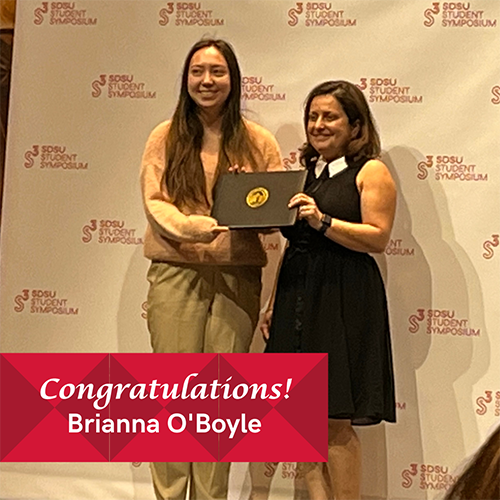 SDSU Student Symposium (S3) Winner
SDSU Student Symposium (S3) Winner
Congratulations to Brianna O'Boyle, MA Linguistics student, for receiving one of the ten President's awards at the 16th annual SDSU Student Symposium (S3). The symposium showcased more than 370 San Diego State University undergraduate and graduate students’ discoveries, innovations and artistic works.
Brianna and the nine other President's Award winners will now advance to the 37th Annual California State University Student Research Competition to be held at SDSU April 28-29.
Learn more about Brianna's research.
"Reading Without Sound: The Linguistic and Neural Processes of Reading in Deaf Readers"
with Zed Sehyr, Ph.D.
Friday, February 24, 2023
1:30 p.m.
BioScience Center
Major Exploration Workshop
Friday, 2/10/2023
Learn about a Bachelor's Degree in Linguistics or Language, Culture, and Society
Still deciding on a major? Find out more about majoring in Linguistics or Language,
Culture, and Society (LCS) and see if it is the right degree for you! You will also
learn about the language majors, minors, and certificates we offer.
MA Program Information Session
Friday, December 2, 2022
11 am - noon
Via Zoom
State Department Selects Csomay for Prestigious English Language Specialist Project
The U.S. Department of State announced the selection of Department of Linguistics and Asian/Middle Eastern Languages Professor Eniko Csomay for a three-month English Language Specialist project focusing on peer mentoring skills and English Medium Instruction (EMI) teaching practice for university faculty in Taiwan at National Sun Yat-sen University. Prof. Csomay is part of a select group, as her project is one of approximately 240 that the English Language Specialist Program supports each year. Read the full news story.
CATESOL Award
MA student Emmanuel Rodriguez has won the CATESOL College/University Level English
Language Research Award, which he will receive at the 2022 CATESOL conference in Pasadena
at the end of September. CATESOL is a professional organization serving teachers of
English to speakers of other languages in California.
Outstanding Graduating Seniors
Congratulations to our Outstanding Graduating Seniors and their Most Influential Faculty.
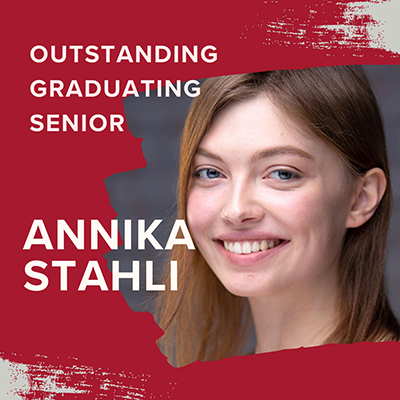
Language, Culture, and Society
Annika Stahli
Most Influential Faculty: Naseh Shahri
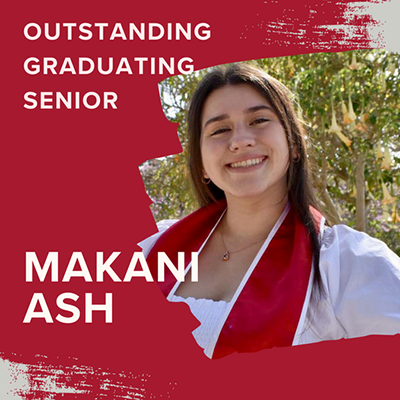
Linguistics
Makani Ash
Most Influential Faculty: Rebecca Egipto
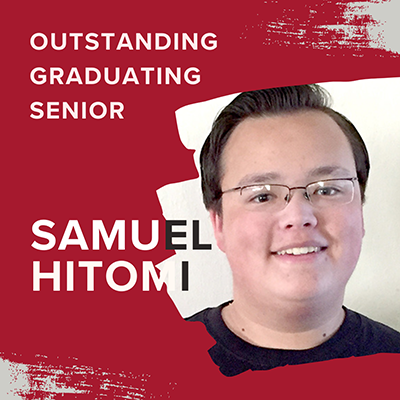
Japanese
Samuel Hitomi
Most Influential Faculty: Yoshiko Higurashi
2022 Department Graduation Celebration
We look forward to celebrating the 2022 graduates with degrees in Linguistics, Japanese, and Language, Culture, and Society!
Please join us with your friends and family:
Friday, May 13, 2022
11:00 AM (PST)
50th Anniversary Celebration
Friday, April 29, 2022 | 1 :00 - 5:00 PM | Storm Hall West SHWW) 011
You are cordially invited to join the department as we celebrate and recognize students, faculty, staff, and alumni.
Opening remarks by Provost Hector Ochoa and CAL Dean Monica J. Casper
Plenary talks by JoanBybeee andNaokooTaguchii
Reception to immediately follow.
How and why languages change: Implications for evolution
JoanBybeee, University of New Mexico
Recent research into two major types of language change—grammaticalization and sound
change affecting consonants—shows that within each type, the set of changes that occur
are very similar across time and across languages, and that in general each type of
change moves in one direction only. Working backwards from known directional changes
leads us to earlier stages in the evolution of language. Research ongrammaticalizationn
shows that the only necessarypree-conditions for grammar are the existence of words
and their common use in a social context. For consonants, a small set gives rise to
all other consonants by sound change, while this same set has no source in sound change,
and thus constitutes a starting point for the evolution of sound systems.
Learning pragmatics: A perspective from Japanese speech style
NaokooTaguchii, Northern Arizona University
Pragmatics is the study of linguistic forms, how they are used, and what meanings they create in social contexts. Crystal (1997) defines pragmatics as “the study of language from the point of view of users, especially of the choices they make, the constraints they encounter in using language in social interaction and the effects their use of language has on other participants in the act of communication” (p. 301). This definition underscores the relations between linguistic forms and speakers, while highlighting agency in linguistic choice-making and the consequences of such choices in social interaction. In this lecture, I will discuss these multiple dimensions of pragmatics in the context of second language acquisition. Using the acquisition of Japanese speech style as an example, I will present three main dimensions of pragmatic competence: (1) knowledge of form-meaning-context mappings, (2) interaction abilities, and (3)agenticc choice-making capacity. I will conclude my lecture with implications for teaching Japanese speech style.
Check out this video to see testimonials of students from the 1970s to 2022.
The Politics of Arabic in the United States: Reflections of the 20-Year Anniversary of 9/11
Keynote: Professor EmeritaGhadaa Osman
Friday, November 19, 2021
Join us as we celebrate our history of excellence in language learning and teaching atSDSUU, featuring a keynote address from the founder ofSDSU'ss Arabic language program, Professor EmeritaGhadaa Osman.
50 Years of Excellence in Language Learning and Teaching - Part of the Anniversary Celebration
Linguistics Student Association Colloquium
Corpus Study: Evolution of TwitterVaxxAntivaxx Discourse, 2006-2022
Monday, May 2, 2022 | 12:00 pm
Featuring Robin Melnick (Pomona College)
In this study, we explore how topic, stance, tone, and form of expression have all
evolved within the public discourse around vaccination, in a conversation that long
predates theCovidd pandemic. As a demonstration of applied corpus linguistics, the
study employs a variety of methods, including initial programmatic development of
a 20M+ Tweet corpus of vaccination discussion, then keyword andcollocationallanalysess,
machine-learning sentiment and topic modeling explorations, and development of a high-accuracy,
deep-learning classifier for assessing a Tweet’s continuous-scale expression of stance
towards vaccination, from strongly pro to strongly anti. As a bonus discussion, we’ll
explore the presence of bots (automated software agents) within our corpus.
Obsolescence or diachronic change? Embracing variation in linguistic analysis
Friday, May 6, 2022 | 1:00 pm
Featuring DanielHieberr (University of Alberta)
Variation and inconsistency within endangered languages are often attributed to language obsolescence, explained either by influence due to contact or by imperfect / incomplete acquisition. Much of this variation, however, can also be understood as the result of natural processes of diachronic change. Language obsolescence is often a convenient scapegoat in cases where variation confounds ouranalysess and no clear patterns emerge from the data. Moreover, documentary linguists often downplay or avoid describing phenomena for which they have no clear explanation or for which they cannot establish a pattern. This results in descriptions that are not only incomplete but fail to provide sufficient detail for future researchers to work out the problem. How then can we improve our linguistic descriptions to better capture variation? And in doing so, what do we gain?
In this paper I provide practical advice for how linguists can improve their treatment
of linguistic variation, and how they can use diachronic theory to better understand
the variation we see. I base the discussion primarily on examples fromChitimachaa
Glottocodee: chit1248; ISO 639-3:ctmm), an isolate language once spoken in Louisiana
in the U.S. Southeast, and today being revitalized by theChitimachaa Tribe. I present
linguisticanalysess and descriptions from archival materials on the language produced
by earlier linguists (most especially MorrisSwadeshh) to show a) how good documentation
of linguistic variation in these documents enables betteranalysess today, and b) how
that variation has informed contemporary grammatical analysis of the language. I conclude
that understanding the processes by which languages change helps us be more tolerant
of linguistic variation in our descriptions and provide a more complete grammatical
picture of the language.
Re-examiningUtoo-Aztecan origins through the lens of linguistic and cultural evolution
Monday, May 9, 2022 | 12:00 pm
Featuring HannahHayniee (University of Colorado Boulder)
Linguistic history provides us not only with insights about how languages change, but also with information that we can use to understand human history more broadly. One prominent theory that links language, culture, and ecology to explain how historical events have shaped human cultural diversity is the Farming-Language Dispersal Hypothesis (Diamond andBellwoodd 2003), which associates the expansion of large language families to the spread of agriculture. In this talk I discuss the history of theUtoo-Aztecan language family of western North America and how agriculture may have shaped its history. While traditional linguistic research has characterizedprotooUtoo-Aztecan as a non-agricultural group of the southwestern USA (e.g. Fowler 1983), Hill (2001) argued instead thatUtoo-Aztecan languages expanded from an agricultural homeland in Mexico, enabled in this demographic expansion by maize farming. Recent collaborative work involving Bayesian phylogenetic methods applied to cognate and cultural data has resulted in new inferences aboutUtoo-Aztecan prehistory that can be used to evaluate competing theories about this family’s spread. Our results show support for aprotooUtoo-Aztecan homeland in or near Southern California, consistent with prior linguistic research (e.g. Fowler 1983). By reconstructing subsistence traits on ourUtoo-Aztecan phylogeny, we are also able to infer thatprotooUtoo-Aztecan communities are likely to have relied primarily on non-agricultural subsistence methods such as foraging. This study demonstrates the value of combining linguistic, cultural, and phylogenetic analysis to help refine our understanding of the events and mechanisms that have shaped linguistic and cultural diversity.
Sponsored by theSDSUU Linguistics Student Association and is supported by the College
of Arts & LettersInstructionallyy Related Activities Fund.
InMemoriamm: Catherine Yiyuu Cho Woo
It is with great sadness that we inform you of the passing of Emeritus Professor Catherine Yiyuu Cho Woo on August 11, 2021.
Dr. Woo was the founding director of the Chinese language program at San Diego State University and served in this capacity from 1970 until she retired in 1997.
Aside from her university work, Dr. Woo was an accomplished painter who was known nationally and internationally. Her paintings have been shown in galleries and museums in Asia and the United States, including at the United Nations, theSacklerr Museum at Harvard University, and the National Gallery in Taipei, Taiwan, among others. In her capacity as an Ambassador for the Arts and intercultural understanding, Dr. Woo was invited to give numerous lectures at universities across the United States and at the United Nations and the National Endowment for the Arts. She also served as the Commissioner for Arts and Culture for the City of San Diego for six years and on the National Council on the Arts from 1991-1996.
She is survived by two children, six grandchildren, and five great-grandchildren.
Her full bio can be found at https://www.cathywoo.com/main/artist.html
Image credit: "Peace and Tranquility" - Copyright © Catherine Yiyuu Cho Woo, 2003 – 2021.
Dinkinn Appears on BBCPodcastt
Professor Aaron J.Dinkinn was interviewed for an episode of the BBCpodcastt "Deeply Human" about accents and dialects.
Persian New Year Celebration
Wednesday, March 23, 2022
5:00 - 9:00 pm
SDSUU International Student Center, 1261 Canyon Crest Dr. (down the street fromHuaxyacacc)
Free event with traditional Persian dinner from Aria restaurant, performances, and special guest DJDavoodd.
Presented by theSDSUU Persian Student Association.
Translingualismm in the L2 Writing Classroom Workshop
with Brooke Schreiber, Assistant Professor
Department of English Baruch College,CUNYY
Friday, November 12, 2021
The wide variety of language backgrounds students bring to our writing classrooms creates tremendous opportunities for instructors, once we know how to recognize and take advantage of multilinguals’ unique abilities in moving across and weaving together languages and cultures. As an approach to writing pedagogy,translingualismm offers ways to bring these abilities into the classroom, to expose and critique harmful stereotypes about multilingual students and traditional beliefs about standard English, and ultimately to make our classrooms and our campus more inclusive and socially just. The session will open with a discussion of what atranslinguall approach to writing pedagogy is, why it’s necessary, and common misperceptions and critiques oftranslinguall approaches. We will then review concrete examples of readings, assignments, and grading practices that incorporate atranslinguall approach. Finally, participants will have the opportunity to discuss how to adapt these activities for their own classrooms.
About the Speaker
Brooke R. Schreiber is Assistant Professor of English Department at Baruch College,CUNYY,
where she teaches courses in second language writing and linguistics. Her research
focuses on second language writing pedagogy and teacher training, as well as global
Englishes andtranslingualismm. Her work has appeared in TESOL Quarterly, ELT Journal, the Journal of Second Language Writing, Composition Studies, Composition Forum, and Language Learning and Technology. She is co-editor of a forthcoming collection on linguistic justice and multilingual
writers.
Master's Research Scholarship Award
Congratulations to M.A. student GabrieleCoccoo on receiving an SDSU Master's Research Scholarship award! Gabriele is interested in all areas of linguistics. His research focuses on
analyzing death row inmates' last words to gain a deeper understanding of the link
between the structure of a text and its communicative purpose.
Fulbright Awarded
ProfessorZhenggshengg Zhang received a Fulbright research award for fall 2021. He will research the language of theDungann Muslims who left China
150 years ago to settle in Central Asia at the International University of Central
Asia in Kyrgyzstan.
2021 Virtual Graduation Celebration
We look forward to celebrating the 2021 graduates with degrees in Linguistics, Japanese, and Language, Culture, and Society!
Please join us with your friends and family:
Friday, May 14, 2021
10:00 AM (PST)
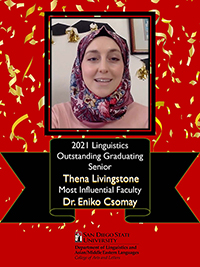
Congratulations to Linguistics Outstanding Graduating Senior, Thena Livingston, and her Most Influential Faculty,EnikooCsomayy.
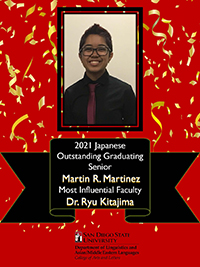
Congratulations to Japanese Outstanding Graduating Senior, Martin R. Martinez, and his Most Influential Faculty,RyuuKitajimaa.
44th Annual Linguistics Student Association Spring Colloquium: Towards Equitable Language
Technologies
Friday, May 7, 2021
Featuring:
Su Lin Blodgett, Microsoft ResearchMontréall
https://sblodgett.github.io
Dr. Blodgett is a postdoctoral researcher in the Fairness, Accountability, Transparency, and Ethics (FATE) group at Microsoft ResearchMontréall. Her work is focused on examining the social implications of natural language processing technologies and in usingNLPP approaches to examine language variation and change. In 2018 she received a Ph.D. in computer science at the University of Massachusetts Amherst working in the Statistical Social Language Analysis Lab.
This event is supported by the College of Arts & LettersInstructionallyy Related Activities
Fund.
Bridging the Academic-Professional Spheres in the TESOL Profession: A Professional Development Workshop
Friday, April 9, 2021
This workshop is intended for all TESOL and General Linguistics MA students, as well as current lecturers of ESL Composition and Foreign Language courses at SDSUU. It has been specifically organized around issues that address the acculturation of graduate students into the profession of TESOL. The workshop leaders are successful alumni and prominent ESL professionals from California Community Colleges.
Topics to be addressed include:
- Strategies for succeeding in interviews for tenure track positions in community colleges
- Understanding the demands of a community college teaching position
- Developing a professional self in graduate school and beyond
Featuring:
- VickieMelloss -- Assistant Professor, Palomar College
- JessicaPardoee – Professor, Santa Rosa College
- JessicaWhitsettt -- Professor, Southwestern College
Language in The Middle: Class and Sexual Discourse in Delhi
Dr. Kira Hall
Professor of Linguistics and Anthropology, University of Colorado Boulder
February 19, 2021
This talk draws from ethnographic research among youth in Delhi’s expanding middle classes to call for more sociolinguistic attention to the role played by sexuality discourse in the reproduction of class relations. The discussion highlights the centrality of the middle classes to sustaining as well as shifting sexualnormativityy, suggesting that sexual norms are in part constituted through everyday discourses that situate middle class subjectivity between two class extremes. Specifically, the talk tracks howHinglishh, as a “sexy” mixed-language alternative to a class system polarized by English and Hindi, came to replace English as the preferred language of sexuality, challenging an enduring colonialist legacy of vernacular censorship. Two case studies are presented: the first involving a bisexual woman who confronts elitist discourse by cursing in Hindi; the second involving atransgenderr man struggling to convince the medical establishment of his worthiness for sexual reassignment surgery. While the protagonists in both narratives loosely belong to Delhi’s expanding middle classes and are speakers of what may be characterized asHinglishh, they are not equally able to master the sexuality discourse that has becomeindexicall of upward mobility
Dr. Kira Hall’s work is situated at the intersection of linguistic anthropology and sociolinguistics, two closely related fields focused on the relationship between language and society. Dr. Hall’s research examines issues of language and social identity in India and United States, particularly as they materialize within hierarchies of gender, sexuality, and socioeconomic class and shift under processes of globalization.
This lecture is hosted by the Department of Linguistics and Asian/Middle Eastern Languages
and co-sponsored by the Department of Women’s Studies with support from IRA funds.
How Trump Talks AboutLatinxss and Mexico
Thursday, October 8, 2020
Dr. Norma Mendoza-Denton
University of California,LossAngeless
Dr. Mendoza-Denton is an anthropologist whose research focuses on youth, language, migration, politics, and identity. She has conducted research among Latina girls involved in gangs, politicians in Town Hall meetings, children in school settings, and young adults playingvideogamess. Her latest book is Language in the Trump Era: Scandals and Emergencies, McIntosh and Mendoza-Denton (eds.), Cambridge University Press. Using many detailed examples, this fascinating and highly topical book reveals how Trump's rallying cries, boasts, accusations, and mockery enlist many of his supporters into his alternate reality. From Trump's relationship to the truth to his use of gesture to the anti-immigrant tenor of his language, it illuminates the less obvious mechanisms by which language in the Trump era has widened divisions along lines of class, gender, race, international relations, and even the sense of truth itself.
This lecture is hosted by the Department of Linguistics and Asian/Middle Eastern Languages
in collaboration with the Department of Chicana/Chicano Studies, with support from
IRA funds.
Awards
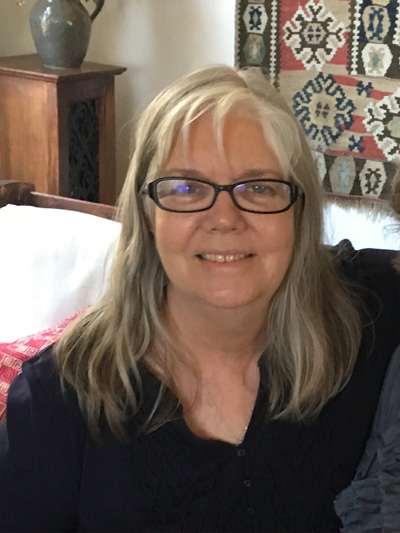
Congratulations to Dr. Deborah Poole, recipient of the CAL Excellence in Service award in the Humanities and the Social Sciences for 2019-2020!
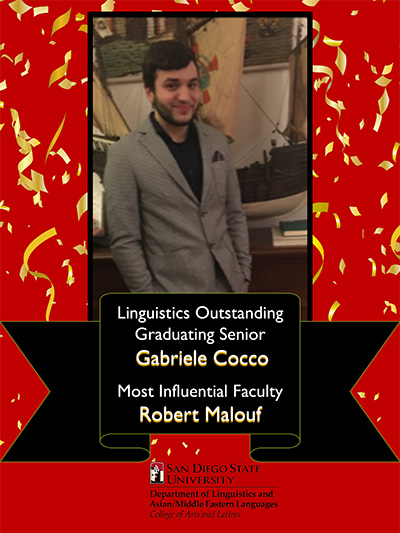
Congratulations to Linguistics Outstanding Graduating Senior, GabrieleCoccoo and his Most Influential Faculty, RobertMalouff.
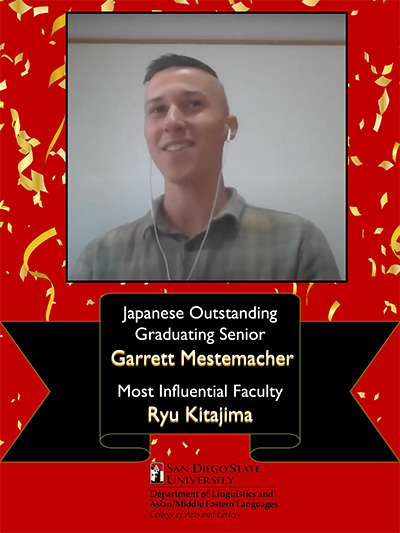
Congratulations to Japanese Outstanding Graduating Senior, GarrettMestemacherr and his Most Influential Faculty,RyuuKitajimaa.
2020 Virtual Graduation Celebration
Watch the 2020 commencement video.
Linguistics Student Association's 42nd Annual Colloquium
Friday, April 12, 2019
Keynote Speaker: Prof. Tyler Peterson (Arizona State University)
Evidentialss and Extended Interrogatives
We know relatively little of the cross linguistic diversity in the kinds of meanings questions can express - especially in endangered and under documented languages. How do we go about uncovering these? The aim of this project is to extend the current empirical base and typological scope of questions, through investigating how different semantic and pragmatic elements affect the kinds of meanings questions express, and how they are interpreted. One of the goals of this talk is to demonstrate the importance of semantic and pragmatic fieldwork, as many of these meanings resist direct elicitation in a field situation. As such, I show how we can ‘scaffold’ our investigation of one kind of meaning into exploring other kinds of `extended’ meanings of questions. This is often aided by following the predictions a theoretical analysis makes.
Dr. Peterson’s personal and professional roots are in the Pacific northwest of Canada.
He did his dissertation with LisaMatthewsonn on theGitksann language Tsimshianicc)
at the University of British Columbia. Although his professional home is in an English
department, his work focuses on the documentation, revitalization, and maintenance
of endangered Indigenous languages, primarily in the Americas and Oceania. He has
a special interest in exploring how everyday technology and contemporary media can
be used as a tool for language documentation and engaging the language learner, as
well as developing teaching resources in these areas. His research as a linguist involves
the theoretical and empirical approaches to the study of meaning (semantics and pragmatics).
Previous to his position atASUU, he was visiting lecturer at the University of Auckland,
New Zealand. In this part of the world, he has a number of currently active language
documentation and research projects that brings his interests together. One of these
projects is on the Cook IslandsMāorii, which includes a component dedicated to language
revitalization, maintenance and literacy.
Figure and Ground in Language and Cognition: Evidence from German and Korean
Wednesday, March 20, 2019
Join us for this special event featuring Dr.SoonjaaChoii (Professor Emerita of Linguistics and Director of Korean Program,SDSUU; Research Professor,Universitätt Wien, Austria)
Regardless of culture and language, we routinely talk about the events we experience and make efforts to be clear and efficient in our communication Gricee 1975). This is true of one of the most frequent event types, motion events Talmyy 1978) having to do with movement of objects, such as putting cup on table. In these events, the moving object (e.g., cup) is the Figure and the reference object (e.g., table) is the Ground. The two entities have distinct perceptual properties and assume conceptually asymmetric roles: Figure(F) is the entity moving along a trajectory (e.g., onto, into) whereas Ground(G) serves to be the non-moving reference frame.
Comparing between German and Korean speakers, I present variation in linguistic description and cognitive behaviors for motion events. In particular, I examine (i) the degrees to which German and Korean speakers differentiate between F and G semantically (spatial terms) and syntactically (grammatical roles: subject, object) and iii) their eye-gaze and memory patterns of F and G. In the linguistic study, participants described dynamic video events involving two objects that systematically switched their F-G roles (e.g., put cup(F) on table(G) and put table(F) under cup(G)). German speakers used distinct spatial terms (e.g.,auff ‘on’,unterr ‘under’) for opposing F-G relations, thus encoding the F-G asymmetry. In contrast, Korean speakers frequently used the same terms (e.g.,kkitaa ‘fit.tightly’) and the same syntactic constructions regardless of the switches in F-G roles. Thesecrosslinguisticc differences were more evident for Non-typical events (put table under cup) than for Typical events (put cup on table), showing that linguistic encoding interacts with degree of familiarity of these events in the real world. The differences also reflect language-specific spatial semantics and differences in the way the two languagesperspectivizee/contextualize the Figure-Ground relation.
German and Korean speakers also differed in perceptual/cognitive behaviors: German speakers looked longer at the Figure particularly in Non-typical events (compared to Typical events), but Korean speakers showed no such difference. In the memory test, German speakers were better than Korean speakers in remembering which object moved, i.e., the Figure. I relate these behavioral differences between German and Korean speakers to their differences in linguistic representation of Figure and Ground
This event is co-sponsored by the Dept of Linguistics and Asian/Middle Eastern Languages
and theSDSUU Linguistics Student Association, and is supported by the College of Arts
& LettersInstructionallyy Related Activities Fund.
Machine Learning as a Tool in Speech Research
Friday, March 8, 2019
Join us for this special event featuring Dr. WillStylerr (Department of Linguistics,UCSDD).
Machine learning, the use of nuanced computer models to analyze and predict data, has a long history in speech recognition and natural language processing, but have often been limited to more applied, engineering tasks. This talk will describe two more research-focused applications of machine learning in the study of speech perception and production.
Sponsored by theSDSUU Linguistics Student Association
Walk in U.S., Talk on Japan
Friday, February 15, 2019
Join us for an interactive talk where speakers from varying backgrounds talk about recent positive developments and attractions in Japan and shed light on aspects of the future in U.S. - Japan relations. The program will include a demonstration of Japanese swordsmanship.
Prime Minister Abe’s Delegation:
- Ambb. KenShimanouchii -Former Ambassador to Spain and Brazil
- Dr.FumiooOtaa -Retired Vice Admiral, Japan Maritime Self-Defense Force
- Ms.Megumii Inoue-Businesswoman
- Ms.YuiiOzakii-University Student
